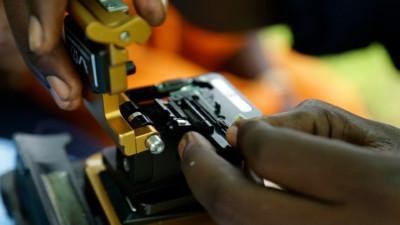November 29, 2023
How investing in digital infrastructure and solutions helps reduce the gender gap
Finnfund’s Digital Infrastructure and Solutions team was established only a couple of years ago, but we have a great spirit of getting things done and we have achieved a lot already during our first years of operation. We have identified three needs or issues that our investments seek to solve:
1) access to basic mobile services in rural areas
2) access to more affordable and higher-speed internet connection across our target regions and particularly in Africa
3) provision of digital services that increase productivity and improve access to products and services.
One thing that we always look at with each investment and throughout the investment life cycle is a gender perspective: how a company can support women as employees, managers and customers.
On a mission to find 15 investees
Recently, we launched an impactful Africa Connected EFSD+ guarantee programme together with the European Union. The programme aims to promote investments in connectivity and digital services in Sub-Saharan Africa, focussing on fragile and LDC countries. Africa Connected will be implemented by direct debt and equity investments into private companies.
Currently, roughly 32% of women in low- and middle-income countries in Sub-Saharan Africa use mobile internet and are 19% less likely than men to use it. This is called the gender gap and it means that roughly 215 million women in Sub-Saharan Africa do not use mobile internet. The main gender target of the Africa Connected guarantee program is to reduce the gender gap and improve access to internet services. This target will be achieved through roughly 15 Digital Infrastructure and Solutions investments of which ten should be 2X eligible. A 2X eligible investment means that the investee company fulfils at least one criterion for a gender-smart investment according to the 2X criteria and has an intention and aim to improve and develop gender equality within the company. The guarantee agreement includes a technical assistance component in which promoting gender equality is one of the main targets. This may include support in carrying out gender diagnostics of businesses, designing gender action plans and training women and creating awareness across organizations.
We have currently 13 companies in our portfolio and several additional investment decisions. These are for example telecom infrastructure operators, fintech companies, energy solutions for mobile network operators and e-commerce platforms. The portfolio is divided almost 50-50 between investments in digital infrastructure and digital solutions. Over 60% of the companies we invest in operate in Africa, followed by Asia with some 30% share. Almost all investments in the 80 million euro portfolio are 2X qualified.
Women as employees, managers and customers
 As an inspiration, I would like to provide two examples of companies that have gender equality at the heart of their business operations. Kasha and BCS Group both operate in East Africa. Kasha is a digital retail, last mile distribution and health tech services platform for health products and household goods. Kasha has a female Founder and CEO and 48% of Kasha’s staff are women. Kasha also employs women in low-income communities as Kasha Agents who serve as the contact point between Kasha and the end-customer. 65% of these agents are women, meaning that Kasha has trained close to 2,000 women as agents in Kenya and Rwanda. In addition to providing health products and household goods, Kasha also offers inventory financing for shops, pharmacies, hospitals and clinics in low-income communities to help them serve their customers or patients and grow businesses. Some 40% of SMEs in Africa are owned by women.
As an inspiration, I would like to provide two examples of companies that have gender equality at the heart of their business operations. Kasha and BCS Group both operate in East Africa. Kasha is a digital retail, last mile distribution and health tech services platform for health products and household goods. Kasha has a female Founder and CEO and 48% of Kasha’s staff are women. Kasha also employs women in low-income communities as Kasha Agents who serve as the contact point between Kasha and the end-customer. 65% of these agents are women, meaning that Kasha has trained close to 2,000 women as agents in Kenya and Rwanda. In addition to providing health products and household goods, Kasha also offers inventory financing for shops, pharmacies, hospitals and clinics in low-income communities to help them serve their customers or patients and grow businesses. Some 40% of SMEs in Africa are owned by women.
BCS is a wholesale telecom operator licensed in seven countries and serving a further 5 countries in Africa at their border points. The group is providing wholesale telecom and broadband services to telecom operators, internet service providers and content providers across East, Central and Southern Africa and is engaged in constructing fibre-optic network infrastructure. BCS has a specific Gender Strategy which provides guidelines for the company. The cornerstones of the strategy are:
1) reducing and closing the gender gap at the workplace
2) activating women in decision making and business implementation
3) promoting gender equality in assessing company resources at all levels and professions and
4) treating people equally regardless of the gender.
 BCS aims to attract women to a male dominated industry through multiple recruitment initiatives, flexible working practices, advancement into management, and equal pay for like-for-like roles. In addition, BCS aims for empowering and keeping women engaged at all levels through training, assisting in leadership roles, and encouraging female staff to participate in the fibre construction process. BCS has also started a mentorship program designed to inspire and empower STEM (Science, Technology, Engineering and Mathematics) students. In this program, BCS harnesses the wealth of expertise among its dedicated employees to provide valuable insights and guidance to STEM students. Through its Volunteer Motivational Speaker Program, BCS is committed to making a meaningful impact on the future of these students and nurturing the next generation of STEM leaders.
BCS aims to attract women to a male dominated industry through multiple recruitment initiatives, flexible working practices, advancement into management, and equal pay for like-for-like roles. In addition, BCS aims for empowering and keeping women engaged at all levels through training, assisting in leadership roles, and encouraging female staff to participate in the fibre construction process. BCS has also started a mentorship program designed to inspire and empower STEM (Science, Technology, Engineering and Mathematics) students. In this program, BCS harnesses the wealth of expertise among its dedicated employees to provide valuable insights and guidance to STEM students. Through its Volunteer Motivational Speaker Program, BCS is committed to making a meaningful impact on the future of these students and nurturing the next generation of STEM leaders.
Both above-mentioned companies promote gender equality in their operations and also see it as an advantage. Encouraged by these and many more examples, I am convinced that all companies can find their own ways of promoting gender equality and harnessing the abilities of women for the benefit of both the business as well as the society. Empowering women and providing them with business and work opportunities means that no available talent goes unseen. I look forward to seeing the gender gap getting closed by the impactful work that our portfolio companies are doing!
Elina Happonen
Portfolio Manager
Elina Happonen works as a Portfolio Manager at Finnfund in the Digital Infrastructure and Solutions team. Finnfund’s investments (portfolio, commitments and decisions) in this sector are currently worth 80 million euros.
Read more:
Telecom infrastructure provider BCS brings female role models into a male-dominated sector
Ticking boxes or setting goals? Gender lens investing is a dialogue
